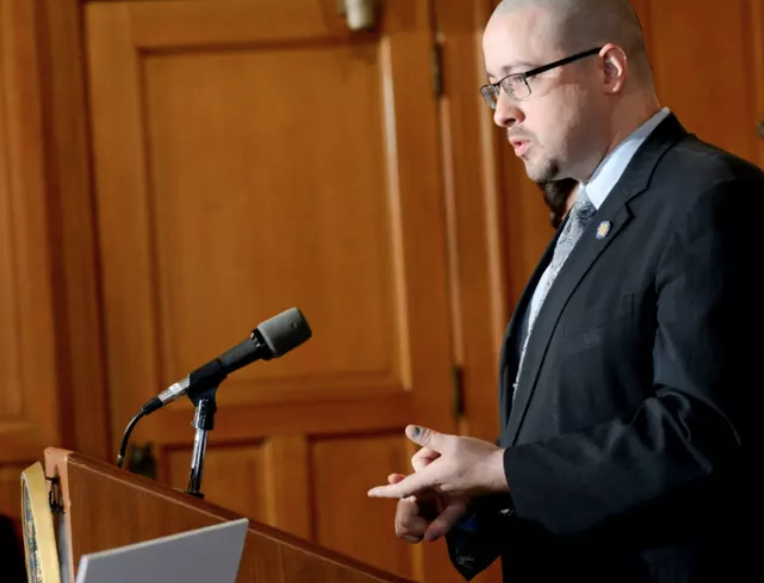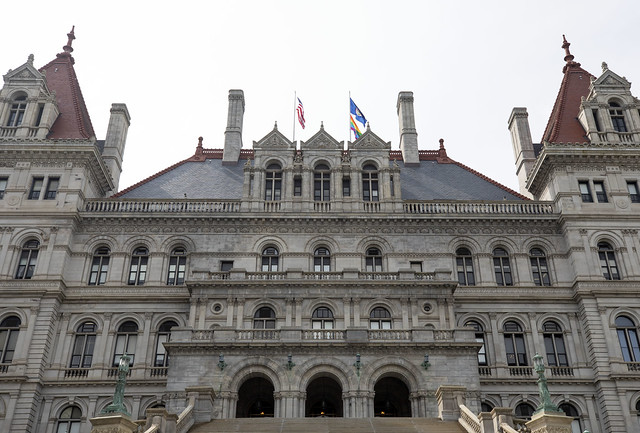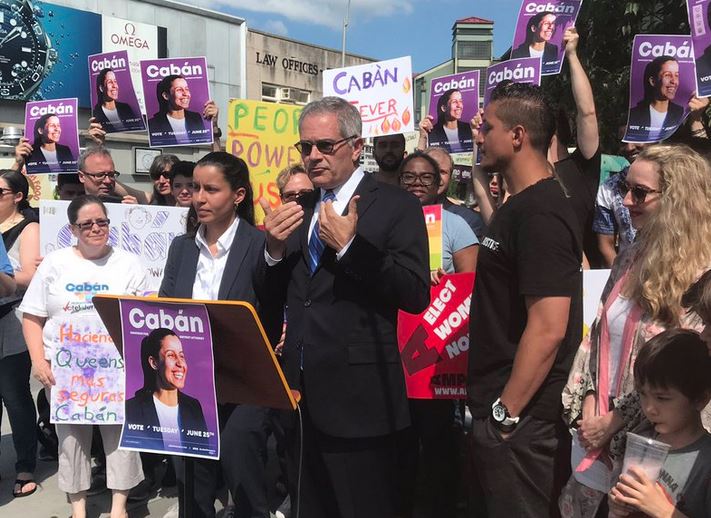I'm Not Running for Congress; Here's Why

Senator Gustavo Rivera, the author (photo: State Senate)
To someone who isn’t from the borough, the mention of the Bronx may evoke images of Yankee Stadium, the Bronx Zoo, or Arthur Avenue. A lesser-known fact is that the Congressional District that covers all three landmarks, and most of the South Bronx, is home to an open seat and will host a highly-contested election in 2020. The future of one of the poorest and most densely-populated districts in the country will be determined next year, making it one of the most important upcoming elections in New York City.
New York’s 15th Congressional District is geographically one of the smallest, with 730,000 people living within its lines. Nearly 97% voted for Barack Obama in November of 2012, making it the most Democratic district in the country. This means the congressional election will be determined in the June primary, not the November general.
For almost 30 years, this district has been represented by the consistently progressive voice of José E. Serrano, who announced his retirement earlier this year. This vacancy is an opportunity to bring new leadership into the House and this district, but it also carries a significant obligation to continue the progressive legacy of the Congressmember while blazing a new trail to effect change.
As the State Senator representing part of this Congressional District, I know well the needs and challenges of this community. The 15th Congressional District faces significant obstacles that are exacerbated by the current federal government. We need bold leadership who fights for fair housing and treats public housing residents with respect; who recognizes that healthcare is a human right; and who stands up for all residents of the district, regardless of citizenship status. The 15th Congressional District also needs a leader who sets an unparalleled ethical standard, just like our retiring Congressmember has done for decades. The work cannot stop; we need someone who will double down on the fight ahead of us.
I believe in public service, and in the positive impact government can have on people’s lives. This belief drove me to run for the State Senate in 2010 and it has been at the center of my efforts in office.
This past year, the State Senate regained the Democratic majority and passed a slew of progressive legislation that New Yorkers badly needed, including the Dream Act, the Reproductive Health Act, criminal justice, voting, and housing reforms, driver's licenses for all, gun regulations, and LGBTQ protections -- among others. I was also given the great honor to chair the Senate Health Committee, a position that had never been held by a person of color or a Bronxite, despite the disparities these groups have faced in accessing healthcare for generations.
The New York State Senate is enacting true change and fighting to help all New Yorkers thrive, but our work is far from done. This responsibility has influenced my decision to not seek the open seat in Congress next year. Representing my community in the State Senate has been the greatest honor of my life, and it is exactly where I believe I can best serve for the foreseeable future. This is particularly crucial since state government is one of the most effective checks and balances on the great national threat from Washington, D.C.
Nonetheless, I cannot ignore the importance of this election at such a critical moment.
The Federal Administration makes a mockery of our democracy daily, and actively works against the communities of my district, the Bronx, and New York City. As we look at a crowded field of Democrats vying for this seat, one thing is clear -- we have a serious responsibility to identify and unify behind a strong leader who will speak on our behalf and will join the new class of Congressmembers that reject the status quo of corporate politics. The 15th Congressional District deserves the very best, and I look forward to hearing from the candidates and eventually endorsing someone who will fight for that same standard for our community and our country.
***
State Senator Gustavo Rivera represents parts of the Bronx and chairs the Senate's health committee. On Twitter @NYSenatorRivera.
***
Have an op-ed idea or submission for Gotham Gazette? Email This email address is being protected from spambots. You need JavaScript enabled to view it.
6 Real, Meaningful Changes New York’s New Campaign Finance Commission Should Pursue

(photo: Mike Groll/Office of Governor Andrew M. Cuomo)
New York State government has often failed to address our biggest challenges. Surprisingly, during the 2019 legislative session real protections for renters were approved over the objections of New York’s powerful real estate industry. Congestion pricing for Manhattan’s central business district was written into law, along with far-reaching climate change legislation. Cash bail was abolished for most crimes, and bump stocks that cause rifles to fire like machine guns were banned. Women’s rights and LGBTQ rights were enhanced in important ways.
Yet, efforts to reform the electoral process stalled after a few notable successes. To revive momentum, Governor Cuomo and the Legislature created a commission and charged it with issuing rules to implement public campaign financing by December 1. The commissioners were named last week and are about to set to work.
Structural change to New York State’s campaign finance system is crucial. The ease with which legislative influence is traded for money in Albany has created a culture of corruption that promotes special interests above the public interest.
We have yet to come to terms with rusting bridges, crumbling infrastructure, and failing public transit networks. Public housing slides further into disrepair daily. Young people of color are denied quality education. Nearly 1 million New Yorkers have no health insurance. The public will be ill-served on these and other matters if legislation responds to the demands of the highest bidders.
As the campaign finance commission begins its work, here are six ways to ensure our state elected officials represent everyone, not just the wealthy and powerful.
1. New York needs lower election contribution limits, a cap on campaign expenditures, and a ban on donations from political action committees, businesses, and unions.
Current law allows candidates for statewide office to accept the obscene amount of $47,500 from a single contributor, and more than $65,000 if they face a primary. State Senate candidates can accept $18,000, aspiring Assembly members more than $9,000. The threshold for all these offices should be lowered to $5,000 so that no single contributor can hold sway over an official. Candidates should also be subject to an overall campaign cap of $1 per constituent to limit the quest for cash.
2. New York should join 29 states that wisely ban elected officials from fund-raising during the legislative session. Cashing checks while passing laws creates the undeniable appearance of corruption. Violators should be forced to forfeit all of an event’s contributions, along with a penalty of an equal amount, into a public election fund.
3. New York should establish a statewide public finance system that mirrors New York City’s. Candidates who meet minimum thresholds should receive $8 of public matching funds for each dollar of a donation up to $250. This would encourage candidates to seek support from all their constituents, not just the rich.
4. Candidates for public office should be required to release five years of federal and state tax returns to enable voters to determine how official decisions might affect a lawmaker’s pockets.
5. Increasing New York’s ban on lobbying after government service from two years to five would provide a greater buffer against the risk of lawmakers trading votes for the promise of future employment.
6. The campaign finance commission should signal support for legislation sponsored by Senator Liz Krueger to strengthen the Joint Commission on Public Ethics (JCOPE).
She has proposed a nine-member commission with five selected by the chief judge of New York and the presiding justices of each of the state’s four appellate divisions, and the remaining four chosen by elected officials. Decisions should be determined by a majority vote.
In addition to overseeing lobbying, the new JCOPE should exercise enforcement power over campaign finance so that the crucial elements of the Albany Arrangement’s pay-to-play culture are monitored by a single entity.
These proposed reforms will diminish the corrosive influence of cash on politics. Transparency and accountability will rise, and the public interest will displace special interests as the most important influence on our lawmakers. The campaign finance commission has a rare opportunity to effect long-lasting improvements to our democracy. They should seize the moment and act boldly.
***
Chris McNickle is a historian, author, and businessman. On Twitter @NYChrisMcnickle.
***
Have an op-ed idea or submission for Gotham Gazette? Email This email address is being protected from spambots. You need JavaScript enabled to view it.
The Year of the Public Defender

Larry Krasner and Tiffany Cabán (photo: @MonicaCKlein)
“I was a public defender. I didn’t become a prosecutor.”
-former Vice-President Joe Biden, addressing former prosecutor Senator Kamala Harris during a Democratic presidential primary debate, June 27, 2019
Public Defenders are familiar with getting little respect. Law school classmates assume you couldn’t get a real job. Family members ask why you aren’t trying to make money. Acquaintances ask with distress and disgust, “How can you represent criminals?” Court officers sneer at you for representing [derogatory word they use to describe your clients]. Prosecutors treat you as if you are gum stuck to their shoe. Judges kowtow to prosecutors. And the media lionizes prosecutors.
True, too, that many of your clients don’t trust you. After all, your service is free and in the United States we believe that anything free is worth what you paid for it. You are appointed by the same government that prosecutes them. And poor people accused of crime don’t get to pick their lawyer – you are foisted upon them (the court adage is that a poor person is entitled to a lawyer but not to one of his choosing).
Most Public Defenders have heard clients say to them, with all sincerity and heartfelt best wishes, “Maybe in a few years you’ll be able to make it to prosecutor.” Other clients, with less well-meaning intent, let you know they wish they had money for a “real” lawyer because they’d beat the case easy. Public Defenders have been referred to by clients as Public Pretenders and Dump Trucks (i.e., they just want you to plead guilty so they can dump your case).
In addition to an often-bruised ego, being a Public Defender can also be hazardous to your career. For those thinking long-term, being a Public Defender isn’t exactly the key to career advancement. You might think that with all their courtroom experience there are a slew of Public Defenders in the judiciary. Well, starting at the top, the last Supreme Court justice with any criminal defense experience was Thurgood Marshall. On the other hand, there are and have been many former prosecutors appointed and rapidly confirmed to the Supreme Court.
And you don’t have to aim that high judicially to be disappointed, and you don’t have to focus on conservative Presidents. Around 14% of President Obama’s nominees for federal district and appeals court judges had experience working in public defense. Meanwhile, 41% of his nominees had experience working as prosecutors.
It’s the same at the state level. A 2011 study found that 15% of State Supreme Court justices had experience as public defenders, compared to 33% of State Supreme Court justices who had experience as prosecutors.
What about legislative aspirations? How’s this for a campaign slogan – “I’m a Public Defender. Elect me your Senator.” Just listen to the debates for the current Democratic presidential nomination and count how many times one of the two dozen combatants intones, “Well, I used to be a prosecutor.” Think back to Clinton v. Trump and how he lambasted her for having been appointed to represent a man charged with raping a child in 1975. I guess his point was that that made her unfit for office.
Yet now it seems Public Defenders are all the rage. There’s even no need to ask or wonder what kind of a Public Defender the person is/was (even though it is well-known that in addition to the many zealous, committed and brilliant Public Defenders, there are quite a few less than brilliant ones). Just wear your Public Defender badge and you’re good to go.
So much for those who looked down their noses at you and with barely concealed contempt asked how you felt about getting guilty people off on technicalities (which happens as often as Haley’s Comet makes an appearance). The worm has turned. Public Defenders are trending.
Consider the Public Defender for District Attorney movement. It’s hard to keep up with, every week another Public Defender is off and running to become a District Attorney and prosecute the clients they had just been defending (though in much gentler, kinder and more thoughtful ways). While the movement comes as a shock to most people, I imagine Public Defender clients are in full “I told you so” mode (see supra – “Maybe in a few years you’ll be able to make it to prosecutor”).
And the Public Defender for District Attorney blitzkrieg is growing as several Public Defenders have pulled off dramatic victories. Now the battle cry is extending beyond mere District Attorney offices as calls abound for Public Defenders to run for judicial office. It might be worth calling a timeout on that one.
While it’s too early to comment on the performances of all the Public Defenders who’ve become prosecutors, there are an awful lot of judges who formerly defended the people they are regularly, and with seeming relish, sending to state prison.
But with all the ever-growing viral love for Public Defenders, nothing can match the latest shout out. Former Vice President, former United States Senator, former Chair of the Judiciary Committee investigating the claims of Anita Hill against Clarence Thomas, he of all people, in response to a withering attack from Senator Kamala Harris during a nationally televised debate, when she accused him of cozying up to racists and racist policies, he, Joe Biden from Scranton, invoked, of all things, his service as a Public Defender. In fact, he threw it back at Senator Harris by almost sneering that she, on the other, less virtuous side, was a prosecutor.
As a former Public Defender, I had palpitations. I mean maybe there are kids out there in America who instead of reading To Kill a Mockingbird and dreaming of becoming a defender like Atticus Finch, will point to that moment as the day they decided to become a Public Defender. I am not sure if Biden ever really was a Public Defender, or for how long, or how competent, but that doesn’t seem to matter to anyone anyway. Just say you were a Public Defender and you win the day.
Think of it. Are there parents out there tucking their kids in at night saying “Dream big, child. One day you can be a Public Defender and then become President” (or maybe after that debate performance, just Vice President).
The Public Defender movement is undeniably gathering steam. Supreme Court Justice Sonia Sotomayor, herself a former prosecutor, has said that there need to be more judicial nominees with backgrounds as civil rights lawyers or Public Defenders. The aforementioned Senator Kamala Harris is showing respect for Public Defenders she didn’t display when she was District Attorney of San Francisco by proposing what she calls the Equal Defense Act that provides for massively increased funding for Public Defenders. Why maybe she’d appoint a Public Defender to the Supreme Court.
But let’s not stop the Public Defender juju there. We need more Public Defenders as pundits and commentators. Are you listening MSNBC? Maybe instead of every five minutes saying, “I’d like to turn now to our expert analyst and former prosecutor,” it could become “What does our resident Public Defender have to say?”
Apparently, public defense isn’t a calling or a political stance but rather is a stepping-stone to bigger and better things. I hear there are some races coming up for police commissioner. Isn’t there an opening for a new Head of Customs and Border Protection? Maybe a Public Defender to run Homeland Security? Seize the day Public Defenders. The sky’s the limit.
***
Steven Zeidman is a professor of law at CUNY School of Law and a former Public Defender. On Twitter @SteveZeidman.
***
Have an op-ed idea or submission for Gotham Gazette? Email This email address is being protected from spambots. You need JavaScript enabled to view it.




